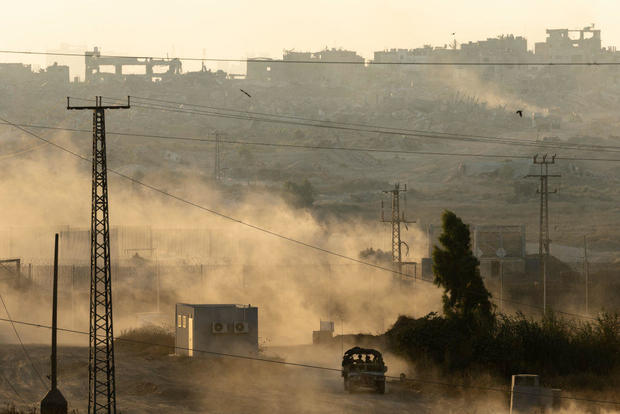Israel considers Hamas response to cease-fire proposal
Israel's Cabinet was expected to discuss Hamas' latest response to a U.S.-backed proposal for a phased cease-fire in Gaza, as diplomatic efforts aimed at ending the nine-month war stirred back to life after a weekslong hiatus.
Fighting, meanwhile, intensified between Israel and Lebanon's Hezbollah, with the militant group saying it fired more than 200 rockets and exploding drones into northern Israel to avenge the killing of a senior commander in an Israeli airstrike the day before.
The relatively low-level conflict has literally set the border ablaze and raised fears of a potentially even more devastating war in the Middle East. Hezbollah has said it will halt its attacks if there is a cease-fire between Hamas — a fellow Iran-backed ally — and Israel.
The United States has rallied world support behind a plan that would see the release of all of the scores of hostages still held by the militant group in return for a lasting truce and the withdrawal of Israeli forces from Gaza. But until now, neither side appears to have fully embraced it.
An Israeli delegation headed by Mossad Director David Barnea is traveling to Qatar in a continuation of talks on the potential cease-fire and hostage deal, a source with knowledge of the talks told CBS News Thursday. He will meet with the Qatari Prime Minister Sheikh Mohammed bin Abdulrahman Al Thani for discussions aiming to bring the parties closer to a deal in Gaza, the source said.
President Biden held a 30-minute call with Israeli Prime Minister Benjamin Netanyahu Thursday, a senior Biden administration official told reporters, during which the two leaders walked through the latest draft of the proposal.
The official said that there has been "a breakthrough on a critical impasse" in the proposal, adding that it was "clear" that Hamas' "response moves the process forward and may provide the basis for closing the deal."
Hamas suggested "amendments" to the proposal last month, some of which the U.S. had said were unworkable, without providing specifics. Netanyahu has confirmed that the original proposal was an Israeli one, but has raised doubts over whether it would end the war — a key Hamas demand.
An Israeli official earlier said that Netanyahu would convene a Cabinet meeting Thursday to discuss the latest developments surrounding the negotiations. The official, who wasn't authorized to discuss the meeting with media, spoke on condition of anonymity.
Hamas political official Bassem Naim said that the group has neither accepted nor rejected the American proposal, and has "responded with some ideas to bridge the gap" between the two sides, without elaborating. Ismail Haniyeh, Hamas' top political leader, has shared suggestions with Egyptian, Qatari and Turkish officials, the group said in a statement late Wednesday.

U.S. officials have said the latest proposal has new language that was proposed to Egypt and Qatar on Saturday and addresses indirect negotiations that are set to commence during the first phase of the three-phase deal that Mr. Biden laid out in a May 31 speech.
The first phase calls for a "full and complete cease-fire," a withdrawal of Israeli forces from all densely populated areas of Gaza and the release of a number of hostages, including women, older people and the wounded, in exchange for the release of hundreds of Palestinian prisoners.
The proposal called for the parties to negotiate the terms of the second phase during the 42 days of phase one. Under the current proposal, Hamas could release all of the remaining men, both civilians and soldiers, during the second phase. In return, Israel could free an agreed-upon number of Palestinian prisoners and detainees. The releases wouldn't occur until "sustainable calm" takes effect and all Israeli troops withdraw from Gaza. The third phase would see the return of the remains of hostages.
The transition from the first to the second phase has appeared to be the main sticking point.
Hamas is concerned that Israel will restart the war after the first phase, perhaps after making unrealistic demands in the talks. Israeli officials have expressed concern that Hamas will do the same, drawing out the talks and the initial cease-fire indefinitely without releasing the remaining captives.
In a lengthy television interview last month, Netanyahu said that he was prepared to make a "partial deal," but was committed to continuing the war "after a pause" in order to annihilate Hamas. Later, speaking before Israel's parliament, he said Israel remains committed to the deal outlined by Mr. Biden.
The war began when Hamas-led militants launched a surprise attack on Oct. 7 into southern Israel, attacking multiple army bases and farming communities and killing around 1,200 people, mostly civilians. They abducted another 250 people. more than 100 of whom were released during a weeklong cease-fire in November.
Israel launched a major offensive in response to the Oct. 7 attack that has killed more than 38,000, according to health officials in Gaza, who don't say how many were civilians or militants. The war has caused vast destruction across the territory, displaced most of its population of 2.3 million — often multiple times — caused widespread hunger and raised fears of famine.
- In:
- Hamas
- Israel
- Gaza Strip
Disclaimer: The copyright of this article belongs to the original author. Reposting this article is solely for the purpose of information dissemination and does not constitute any investment advice. If there is any infringement, please contact us immediately. We will make corrections or deletions as necessary. Thank you.







